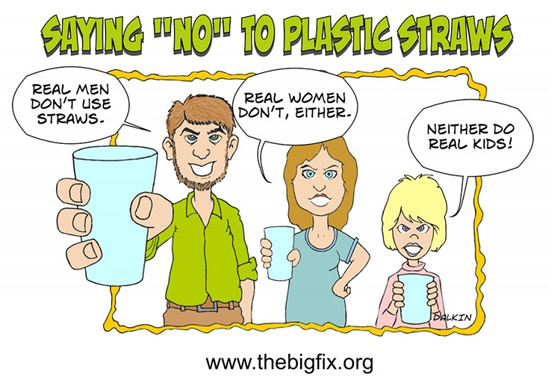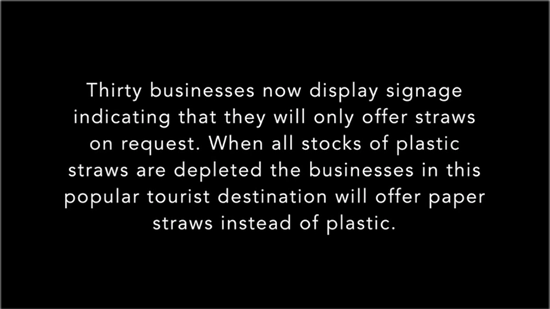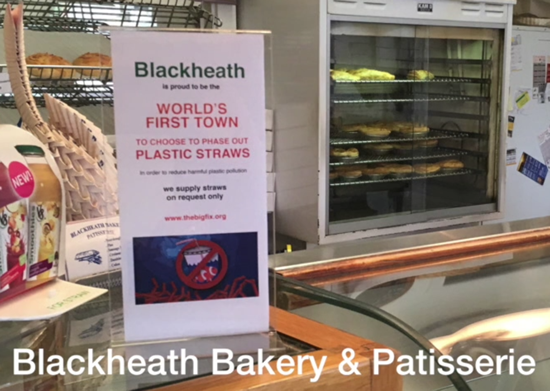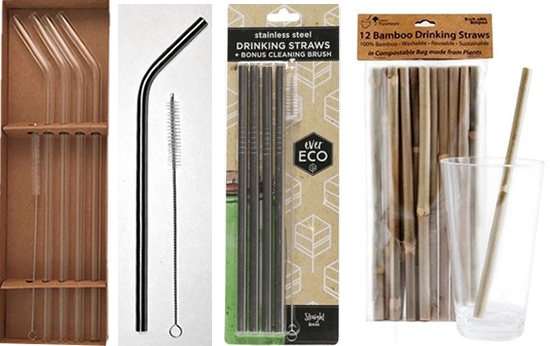
Say No To Plastic StrawsSource: Ian Dalkin #
In the iconic World Heritage listed Blue Mountains is the town of Blackheath, some 112 kilometres west of Sydney. With a population of 4569 this historic tourist town swells with visitors for overnight stays to stays of 3 to 4 days over weekends and holiday times. Attracted to eating out at restaurants, cafes enjoying historic buildings, Bushwalking and rainforest walks and to visit national parks or state parks or even just visiting friends and relatives.
Local businesses are made up of cafes, restaurants, bakeries, grocery shops, delicatessens, takeaways, service stations and pubs so the use of the most superfluous item ever made out of plastic, straws, had the potential to be quite high.
The Kritic recently chatted with Lis Bastian, from The Big Fix, who is a local resident of Blackheath that became interested in doing something about the use of plastic straws in her town. Ms Bastian decided that the most environmentally responsible solution to the problem was to end their use and set about questioning each of the shop-front businesses in order to find out exactly how many straws were being used. Of the 30 store front local businesses that use straws Ms Bastian found that they were using a total of 40,000 straws per month.
With such a large quantity being used each month, stocks of plastic straws amongst the businesses was quite high so an immediate ban was not feasible additionally “Some businesses weren’t keen on the idea – partly because they preferred plastic straws and partly because of the cost of paper straws.” So it was decided that a phase-out of plastic straw usage was the best way to proceed. With different businesses using vastly differing amounts of straws a month it was imperative that she find out how many each business used and also the stocks of plastic straws held. To facilitate the phase-out out Ms Bastian organised a community paper straw bulk buy and sponsorship from American manufacturer Aardvark and Australian distributor Green Pack.
The time frame involved in getting to this stage of the phase-out was a couple of months as initially there was some reluctance to change so “there was a need to talk to every business and research substitutes for plastic and where I could get them.”
Those of us outside of Blackheath first heard of the move to ban plastic straws at the end of October 2016 how is the phase out going?
“The phase out isn’t complete. Some people use so few straws that they still have plastic straws left. And, in some businesses, people keep asking for plastic straws. ie. the businesses are willing to give up plastic straws but the customers aren’t, so they still make both plastic and paper available.”
With your campaign has there been any emphasis on discouraging the use of any straw?
“Yes, we did cartoons and campaigns to encourage people to not use straws at all. There was also a DL size brochure in a plastic stand placed on each counter advising that the stores only supplies straws on demand. We believe that as community awareness rises, more and more people will choose to ‘Say NO!’ to straws, and that the demand, even for paper straws, will decrease. Globally billions of straws are thrown out each day and Blackheath alone has been throwing out around 40,000 straws a month! Because they don’t biodegrade, they are amongst the top plastic pollutants harming our waterways, oceans and ecosystems. This is such a small and easy thing each one of us can do and I’m thrilled that the businesses of Blackheath have worked collaboratively to achieve this milestone.


Straws on requestSource The Big Fix
Re-usable alternatives to plastic straws, are available, they come in Borosilicate Glass, Titanium, Stainless Steel and Bamboo. Are you aware of any local pubs, cafes or restaurants that are, or may be considering, using re-usable straws?
“I’ve heard of them in other parts of Australia, eg. Manly, but not Blackheath”

Re-Usable strawsSource Google Ads
Being that Blackheath is part of the greater area of Blue Mountains City is there a move to get the other towns to follow with their own bans?
“The Combined Business Chambers in the Mountains have shown an interest in doing something about it but haven’t done anything yet as far as I know. A couple of businesses in Katoomba have stopped selling plastic straws.”
Has the Blue Mountains City council been approached about a city wide ban?
“The Greens Councillor, Kerry Brown moved a motion to move away from single use plastic but it wasn’t fully accepted… the final motion that was voted on was to write to the State Government to ask for a ban on plastic bags.”
The Kritic approached Councillor Kerry Brown for a comment.
“It is heartening that Blackheath businesses are showing leadership on protecting the environment by phasing out plastic straws even when there may be some extra cost in buying biodegradable straws. Of course, by discouraging people from using straws unnecessarily, overall costs to businesses will be reduced. Stopping waste saves money.
“While Council can’t legislate about plastic straws, we can certainly act to promote this initiative and others like it and to educate the public. I encourage suggestions from the community on how Council could help more to eradicate single-use plastics.”
Any final words about the straw ban?
“Ideally we’d like to encourage people to not use straws at all. We were fortunate to get sponsorship from Aardvark straws and GreenPack which made it more accessible for our local businesses.”
Will you be announcing a plastic bag ban any time soon or perhaps a ban on disposable coffee cups in favour of the BioCup or bring your own? What about take away containers?
“We have a Boomerang Bags group (that) has started who are working on plastic bags and a local cafe is starting an Emergency Mug Wall… we will gradually work our way through doing something about all single-use plastic items.”
Update:
Boomerang Bags Blackheath have announced that on Monday, 6th November, with the help of numerous, wonderful, local volunteers they will be launching with 500 Boomerang Bags.
# Ian Dalkin – Say No To Plastic Straws – When The Big Fix approached local businesses to see if they’d agree to help Blackheath phase out plastic straws, one common remark was that men rarely use straws… it’s mostly women and children. This triggered an idea that local artist and designer Ian Dalkin developed into a cartoon. It has since become the basis of the Blackheath Gets Real Campaign… if real men don’t need straws, then real women and real children don’t need them either… so let’s all collaborate to Get Real About Plastic Pollution by SAYING NO! to plastic straws.
 Who Gives A Crap?Source: Good Goods
Who Gives A Crap?Source: Good Goods
Have you ever wondered Who Gives A Crap every time you wipe your bum? I am sure the 2.4 billion people that don’t have access to a toilet do. If you could lend a hand to these people with every motion you have would you?
In 2010 Australian trio Simon Griffiths, Jehan Ratnatung and Danny Alexander began working on a new social business to address the fact that 40% of the world’s population does not have access to a toilet. “We wanted to find a way to use mass-market products that are available anywhere in Australia. The answer: toilet paper! We quickly realised we were onto something and Who Gives a Crap[1] was born.” says Simon Griffiths. So in July 2012, Simon, Jehan and Danny launched Who Gives A Crap with a crowdfunding campaign on IndieGoGo[2] which ended up raising $66,548, 133% of their $50,000 fixed goal by the end of the campaign. They were able to deliver their first product in March 2013.
Who Gives A Crap is a feel good toilet paper from an Australian company, with offices in the UK and USA, whose social and environmental mission is integral to the project. The company donates 50% of its profits to non-profit organisations working to improve access to hygiene, water and basic sanitation in developing countries. WaterAid[3] is one such organisation and it has deep experience and skill in implementing high impact sanitation projects throughout the developing world.
The Who Gives A Crap Brand Mission
“Our goal is to make sure everyone has access to a toilet by 2050. Building a sustainable business model that delivers quality and environmentally responsible products at competitive prices is how we’re going to get there.”
Their Brand Mission is reflected in the choice of materials that their products are made from, mainly 100% Recycled paper, Bamboo and Sugarcane. The decision to set up operations in China was a decision made after taking into consideration a number of factors. These includes things like:
- Product quality and packaging options: e.g. being able use paper wrappers and recycled cardboard boxes rather than plastic – we couldn’t find an Australian producer that could do this.
- Materials: having access to a large pool of raw materials – post consumer waste paper and bamboo (which isn’t readily available in Australia).
- Cost of operations: Australian toilet tissue manufacturers are few and far between and also have their own brands to produce and sell – so we’d be their competitors!
The Who Gives A Crap range of products
- Recycled paper Toilet Paper – Made with 100% recycled paper, No inks, dyes or scents, 3-ply.
- Premium 100% Bamboo Toilet Paper – Made with 100% forest friendly bamboo, No inks, dyes or scents, 3-ply.
- Forest Friendly Tissues – Made with 100% bamboo, 3-ply.
- Forest Friendly Paper Towels – Made with a blend of bamboo and sugarcane, Super strong 2-ply, No inks, dyes or scents.
- Roll Model Jumbo Roles – Made with 100% recycled paper, 300 metre rolls for use in industrial dispensers, No inks, dyes or chlorine, 2-ply.
- 100% Money Back Guarantee on all products.
Impact to date
According to their website they have, to date, donated $478,500 and they say “…and we’re just getting started!” Through their forest friendly paper products they have saved 30,797 trees. By making their products using eco-friendly materials they have saved 74 million litres of water and by using cleaner processes they have avoided 5,922 tonnes of greenhouse gas emissions.[4]
Sanergy[5] is one of Who Gives A Crap’s favourite organisations in the loo world and a new partner. Sanergy build low-cost, high-quality Fresh Life Toilets and then franchise them out to locals they call Fresh Life Operators to clean up Nairobi’s slums. Then they collect the waste from every one of their hundreds of toilets each week and turn it into useful agricultural products like fertiliser and animal feed, which they sell to Kenyan farmers. Who Gives A Crap have donated $50,000 towards their work.
Who Gives A Crap are on track to achieve $1 million in total donations by the end of the financial year.
Who assesses your claim about donating 50% of profits?
“We are certified B Corp, which means that we’ve been assessed as a ‘for benefit’ company, rather than purely ‘for profit’. This certification covers a wide range of aspects of our business and ranks our performance across a rigorous set of criteria. Part of this certification involved an independent assessment of our financial statements confirming our claim to donate at least 50% to charities.”[6]
B Corporations are a group of companies that are using the power of business to create a positive impact on the world and generate a shared and durable prosperity for all. The Who Gives A Crap 2016 B Impact Report, which is published online[7], gives Who Gives A Crap a score of 101, out of a maximum of 200, where as the median score for all assessed companies is just 55.
Who verifies your claims about environmental impact and sustainability?
We’ve had an independent life cycle assessment of our business undertaken by Life Cycles in October 2016 to ensure that the environmental claims we make are backed up by science.[8]
Lifecycles[9] undertook an environmental mapping project to help Who Gives A Crap back up their claims and understand what the actual environmental impacts are of their activities. This was accomplished by undertaking a Life Cycle Assessment(LCA) study that included raw materials of their different product ranges (recycled paper, bagasse, bamboo), packaging, transport & logistics and company overheads.
Where is your stuff made?
Where we choose to produce our products is a big deal, and setting up operations in China is a decision we’ve made after taking into consideration a number of factors. These includes things like:
- Product quality and packaging options: e.g. being able use paper wrappers and recycled cardboard boxes rather than plastic – we couldn’t find an Australian producer that could do this.
- Materials: having access to a large pool of raw materials – post consumer waste paper and bamboo (which isn’t readily available in Australia).
- Cost of operations: Australian toilet tissue manufacturers are few and far between and also have their own brands to produce and sell – so we’d be their competitors!
In seeking further information as to why they decided to set up production in China and use Chinese sourced materials Who Gives A Crap Customer Happiness Executive Megan Olney responded with the following information:
“Our bamboo is predominantly grown in remote areas of Sichuan Province, China by local farmers who plant bamboo on the borders of their small family farms to supplement their income. Unlike industrial agriculture (like special plantation forests created for toilet paper and other paper products) no vast areas of land are cleared. On top of this, the bamboo process is all very localised. Each village has their own bamboo co-op and after it has been harvested, it gets chipped and then goes to a local pulp factory. Sourcing bamboo this way means there’s no adverse affects on natural forestry or wildlife.”
“At this stage there are no Australian producers making bamboo pulp.”
“There are only two Australian producers who make recycled tissue paper domestically (alongside their non-recycled, virgin tree production). Both of these producers have their own brand of recycled toilet paper that they produce and sell into Australian supermarkets. We have spoken to these producers in the early stages of launching our business and were very close to working with them to produce our products, but they then decided to pull out of negotiations in favour of selling their own brands, which is totally understandable. We are a competitor to their own business interests, so we couldn’t work with either. Instead, we had to find a producer from outside of Australia, and China made the most sense.”
How do you monitor working conditions and wages in the second world country of China?
At our request, our recycled paper producer has been independently audited and certified by the BSCI[10] (Business Social Compliance Initiative). The BSCI audit focuses on driving social compliance and improvements in global supply chain management. The audit scored our producer the highest grade available across multiple categories including workers rights to freedom of association and collective bargaining, no discrimination, no child labour, no precarious employment, no bonded labour, and ethical business behaviours. They also scored highly in the category of fair remuneration. Of course there’s always room for improvement and we will be working closely with our producers to ensure a transparent working relationship.
Concern for the amount of fossil fuel miles attached by the shipping from China to Australia.
It’s great that Who Gives A Crap use a renewable resource for their product range but it would be better if that resource did not come with so many fossil fuel miles attached by the shipping from China to Australia. So how does Who Gives A Crap justify this? I was referred to the following information[11]:
“We’re based in Melbourne but also have warehousing in Brisbane, Sydney, Canberra, Hobart, Adelaide and Perth. Our manufacturer is based in China and we ship via sea freight directly into each of the ports where our warehouses are located (apart from Canberra of course!).
It may seem counter-intuitive, but the transport emissions incurred as a result of our shipping are slightly lower than they would be if we manufactured domestically in a single location and road-freighted stock across the country. To test this reasoning, we’ve commissioned an initial analysis of our whole business practice by an external life cycle assessment group. This analysis has included modelling the environmental impacts of three production scenarios:
- Producing in China and sea freighting into each port
- Producing in Victoria and road freighting into the major cities
- Producing in Victoria and rail / road freighting into the major cities
The analysis included modelling outputs of global warming potentials, particulate matter, land use, and water scarcity. The results show that there are no consequential environmental benefits if we were to produce locally in Australia. This is largely because our operation minimises road transport emissions as much as possible by shipping directly into the major ports and distributing from there (sea freight miles are 6-10 times less emissions-intensive than road miles).
The above analysis does not include final deliveries from warehouse to customer (which would happen regardless of where we produced). But we’re proud to say that we’ve partnered with Sendle[12], Australia’s first carbon neutral delivery service, to deliver all our packages going to TAS, ACT, NSW, QLD, and metro VIC.”
Can you envision a future where producing your product takes place domestically?
Megan Olney responded with “It’s certainly never off the table. If the conditions and available options to produce the product we want domestically become available, it’s definitely something we’d seriously consider. There are real instances where the choices we make aren’t straightforward and barriers can and do exist, but we’re always looking for ways we can learn and improve what we’re doing. The more toilet rolls we can sell, the more influence we might have down the track.”
“Crap” Brand Promotion
Given the name of the brand you can imagine the amount of toilet humour that comes along because of it and Who Gives A Crap has taken that and made it an integral part of their promotions. The original IndieGoGo campaign was launched with a live stream of Simon Griffiths sitting on a toilet stating “I’m not leaving this toilet until we pre-sell $50,000 of product”. 50 hours and one cold bottom later, they had raised over $50,000.
Testimonials[13]
Sarah L. – Love it!!! Who Gives a Crap is the best ethical toilet paper ever. Super fast delivery and a completely easy ordering process. I love the fact that having toilet paper delivered in bulk helps me to avoid the supermarkets yet again. I’m never going back to the alternative 🙂
Jody T. – I give a crap. Not only is this toilet paper great on your bum but every time we go to the toilet we show that we give a crap. Admire these guys for their ingenuity and for taking caring for others to a whole new light. Just love it.
Jenna M. – Excellent paper. Not only do we feel really good about buying 100% post consumer recycled loo paper with no plastic packaging that helps create access to toilets in the 3rd world, but it’s actually really good toilet paper! soft and thick and everything you want for your bottom. plus the wrapper makes great wrapping paper and a good conversation starter. great work, thanks.
Tony V. – Who gives a crap – wee can! Great prop for the long drop. Chemical free when your having a wee. Best for you when you’re having a p(ee or oo) Great marketing because the more I spend, the more that goes overseas so that others can enjoy the level of sanitation we take for granted in Oz. Great concept!

Where to purchase the products
If you are in Victoria you can find 6 packs in many independent grocery stores across the state. For the rest of Australia you will need to place an order online.

A special “Thanks” to Elizabeth Walton for her assistance with the background research!
[1] Who Gives A Crap – https://au.whogivesacrap.org/
[2] Indiegogo Who Gives A Crap Campaign – https://www.indiegogo.com/projects/who-gives-a-crap-toilet-paper-that-builds-toilets#/
[3] WaterAid – https://www.wateraid.org/au
[4] Impact To Date – https://au.whogivesacrap.org/pages/our-impact
[5] Sanergy building healthy, prosperous communities – https://saner.gy/
[6] How much do you donate in dollar value? – https://support.whogivesacrap.org/hc/en-us/articles/219112747-How-much-do-you-donate-in-dollar-value-
[7] Who Gives A Crap 2016 B Impact Report – https://bcorporation.com.au/community/who-gives-a-crap/impact-report/2016-02-10-000000
[8] Life cycle assessment group – https://www.lifecycles.com.au/
[9] Walk the Talk – https://www.lifecycles.com.au/single-post/2017/01/07/An-environmental-mapping-of-an-eco-product
[10] BSCI (Business Social Compliance Initiative) – https://www.bsci-intl.org/
[11] How emissions intensive is the production and delivery of your product? – https://support.whogivesacrap.org/hc/en-us/articles/219112807-How-emissions-intensive-is-the-production-and-delivery-of-your-product-
[12] Sendle – We help good business deliver – https://www.sendle.com/
[13] Testimonials – https://www.facebook.com/WhoGivesACrapTP/app/226132034107547/?ref=page_internal




